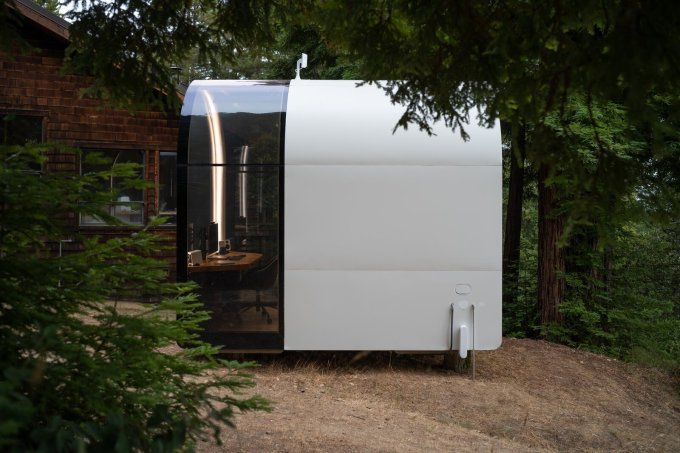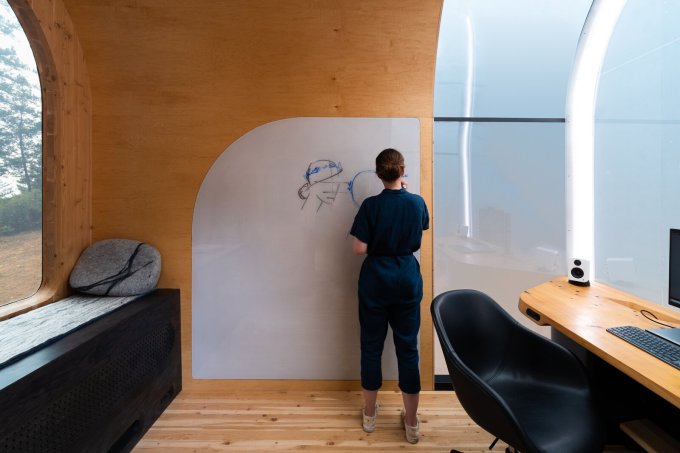Tiny houses might have lost some of their luster in the COVID era, but a reimagined future for remote work might call for tiny offices.
According to Nick Foley, Denizen founder and CEO, people are clamoring for a serene space to think these days — and they’re happy to pay for it.
Foley is the former chief product officer and director of industrial design for Jump Bikes, a bike-sharing company acquired by Uber in 2018 for $200 million. With Denizen, he’s setting out to answer one question: “Can you build an office space as a product that’s just a phenomenal experience for a single person to have the perfect workday?”
Foley thinks that WeWork got some things wrong about how to optimize the work environment. While plenty of people reap the social benefits of co-working, a buzzing environment full of workers focusing on different projects can be detrimental to the kind of flow state that some work necessitates.

Denizen’s solution is to build a small army of itty-bitty standalone offices that come pre-constructed, packed with outlets, USB plugs, cameras (for videoconferencing), speakers, an integrated router and even a whiteboard wall, all in less than 100 square feet. Denizen’s office pods are beautifully designed, with windows that can turn opaque in seconds for privacy, recyclable materials and an aesthetic that’s right at home in Dwell (they were actually just featured in Dwell, because of course they were).
“The ceiling is really high, the glass is all around you — it just feels expansive and huge,” Foley said, adding that Denizen is all about giving people the tools they need to have “inspired, productive workdays.” And they’re not just a beautiful concept image — a friend of Foley’s who works for NASA’s Jet Propulsion Laboratory gave us a virtual tour of his own Denizen-built micro workspace.
Denizen initially only planned to provide its pre-fab office pods to employers, who could rent them on a monthly subscription basis. But the demand from people stuck working from home and searching for an alternative was so great that the company now plans to sell the standalone offices on wheels to individuals, who can keep them at their home residences. One of Denizen’s beautiful, high-tech tiny offices will set you back about $55,000 as an individual.
Foley sees the Denizen model as something that would fit into a company’s COVID-era real estate plan. With fewer workers coming into the office, companies are downsizing the expensive and often sprawling campuses that have long defined them and looking to explore more flexible, bespoke options that better fit the future of work. For an employer with a bulk deal, Foley expects that each smartpod will run around $1,000 per month to rent.

The pods could supplement traditional offices with inspiring solo office settings, but Foley hopes that some day companies or even city governments might place clusters of Denizen office pods in green spaces where they could be booked out by the day.
“The real dream is honestly very similar to Jump Bikes… Figuring out how to collaborate on the neighborhood level to make these really amazing shared use amenities,” Foley said.
The company is currently raising a seed round of funding and signing up companies in the Bay Area and further afield in California for multi-unit tests that will start in early 2022. It’s looking to scale slowly, selling about 100 units next year while it streamlines the manufacturing experience to get the product just right.
Jump bikes are now on the Lime app and heading to more cities
Because the smartpods are on wheels, Denizen smartly eschews many of the permitting headaches that Foley’s team would otherwise get bogged down in. “I understand how that can be a complication to a business model,” Foley says, citing his experience installing kiosks and parking structures for Jump Bikes.
Instead of navigating labyrinthine local regulations, anyone with a 12×7.5-foot area and the cash to spare can roll right into one of the little pod offices and get to work. From a regulatory perspective, it’s basically a beautiful little RV, sans plumbing.
Foley is excited about how his vision fits into the future of work, but he’s also excited about the literal nuts and bolts of putting Denizen’s tiny offices together. Production for the pod offices blends large-scale CNC automation, 3D printing and sophisticated product design into a product that’s pre-fabricated and ready to ship to Denizen’s early customers on the West Coast, wheels and all.
































Comment